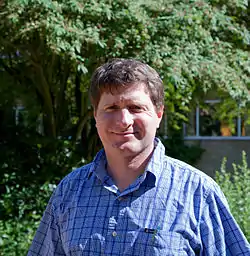Ian Agol
Ian Agol (born May 13, 1970) is an American mathematician who deals primarily with the topology of three-dimensional manifolds.[2]
Ian Agol | |
|---|---|
 Ian Agol at Aarhus University, August 2012 | |
| Born | May 13, 1970 Los Angeles, California, U.S. |
| Nationality | American |
| Alma mater | California Institute of Technology University of California, San Diego |
| Known for | Virtually Haken conjecture Freedman–He–Wang conjecture Wise's conjecture Marden tameness conjecture |
| Awards | Breakthrough Prize in Mathematics (2016)[1] Veblen Prize in Geometry (2013) Senior Berwick Prize (2012) Clay Research Award (2009) |
| Scientific career | |
| Fields | Mathematics |
| Institutions | University of California, Berkeley |
| Doctoral advisor | Michael Freedman |
Education and career
Agol obtained his Ph.D. in 1998 from the University of California, San Diego with Michael Freedman (Topology of Hyperbolic 3-Manifolds).[3] He is a professor at the University of California, Berkeley[4] and a former professor at the University of Illinois at Chicago.[5]
Contributions
In 2004, Agol proved the Marden tameness conjecture, a conjecture of Albert Marden.[6] It states that a hyperbolic 3-manifold with finitely generated fundamental group is homeomorphic to the interior of a compact 3-manifold. The conjecture was also independently proven by Danny Calegari and David Gabai, and implies the Ahlfors measure conjecture.[6]
In 2012 he announced a proof of the virtually Haken conjecture, which was published a year later.[7] The conjecture (now theorem) states that every aspherical 3-manifold is finitely covered by a Haken manifold.
Awards and honors
Agol, Calegari, and Gabai received the 2009 Clay Research Award for their proof of the Marden tameness conjecture.[6]
In 2005, Agol was a Guggenheim Fellow.[8] In 2012 he became a fellow of the American Mathematical Society.[9]
In 2013, Agol was awarded the Oswald Veblen Prize in Geometry, along with Daniel Wise.[10]
In 2015, he was awarded the 2016 Breakthrough Prize in Mathematics, "for spectacular contributions to low dimensional topology and geometric group theory, including work on the solutions of the tameness, virtually Haken and virtual fibering conjectures."[11]
In 2016 he was elected to the National Academy of Sciences.[12]
Personal
His twin brother, Eric Agol,[13][14] is an astronomy professor at the University of Washington in Seattle.[15]
References
- Lamb, Evelyn (8 November 2015), "By Solving the Mysteries of Shape-Shifting Spaces, Mathematician Wins $3-Million Prize", Scientific American
- Mackenzie, Dana; Cipra, Barry (December 20, 2006). What's happening in the mathematical sciences. American Mathematical Society. pp. 15–16. ISBN 978-0-8218-3585-2.
- Ian Agol at the Mathematics Genealogy Project.
- "Ian Agol". University of California, Berkeley Department of Mathematics. Retrieved June 25, 2011.
- "Ian Agol". University of Illinois at Chicago. Archived from the original on June 16, 2011. Retrieved June 25, 2011.
- "Clay Research Award". Clay Mathematics Institute. Archived from the original on June 26, 2011. Retrieved June 25, 2011.
- Agol, Ian (2013). "The virtual Haken conjecture. With an appendix by Agol, Daniel Groves, and Jason Manning" (PDF). Documenta Mathematica. 18: 1045–1087. MR 3104553.
- "Ian Agol – Guggenheim Fellows Finder". John Simon Guggenheim Memorial Foundation. Retrieved June 25, 2011.
- List of Fellows of the American Mathematical Society, retrieved 2012-11-03.
- Joint Mathematics Meetings Prize Booklet: January 2013 Prizes and Awards: Oswald Veblen Prize in Geometry, pp. 14–18
- "Breakthrough Prizes Give Top Scientists the Rock Star Treatment". New York Times. Nov 8, 2015.
- National Academy of Sciences Members and Foreign Associates Elected, News from the National Academy of Sciences, National Academy of Sciences, May 3, 2016, archived from the original on May 6, 2016, retrieved 2016-05-14.
- "Obituaries – Alan Agol". Visalia Times-Delta. October 4, 2005. p. C2.
- "Alan Agol". Marin Independent Journal. October 5, 2005.
- "Eric Agol". University of Washington Department of Astronomy. Retrieved June 25, 2011.
External links
- Ian Agol publications indexed by Google Scholar